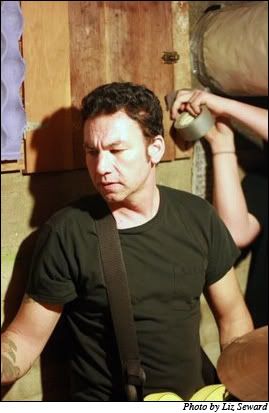 Last night, between dates at Thrillhouse Records and Gilman, Thorns of Life played a stellar show with Santiago and the Semi-Evolved Simians in the basement of Adam’s house in Santa Rosa. It’s more like an interrogation chamber than a basement down there, but in spite of our repeated warnings to the band in the last few weeks that the downstairs is a tiny, 10-foot-by-15-foot concrete cell, they kept shouting back their approval. It’s small? Sure! It’s cramped? We’re there! It’s going to be a total disaster? Great!
Last night, between dates at Thrillhouse Records and Gilman, Thorns of Life played a stellar show with Santiago and the Semi-Evolved Simians in the basement of Adam’s house in Santa Rosa. It’s more like an interrogation chamber than a basement down there, but in spite of our repeated warnings to the band in the last few weeks that the downstairs is a tiny, 10-foot-by-15-foot concrete cell, they kept shouting back their approval. It’s small? Sure! It’s cramped? We’re there! It’s going to be a total disaster? Great!
So the basement it was, as Thorns of Life—Blake Schwarzenbach, Aaron Cometbus, and Daniela Sea—came to Santa Rosa for another hush-hush house show last night on their West Coast tour. There were some hidden flyers around town, but unless you looked inside dumpsters, sewer tunnels and library book-return slots, you had to rely on the word-of-mouth secret show game, with all of its social awkwardness and selective dispensing. But in the end? A night, as they say, for the books.
Looming over the house at the onset was a freak nervousness, aided by the cops parked a couple houses down. Then: the slow dissipation. The opening bands, the opening beers, the opening hearts. Sweat doesn’t just break through the lining of the skin; it opens up invisible barriers. By the time Thorns of Life played, there was no option but the personal. I sat essentially on top of Blake’s shoes with a sea of people at my back; Blake fit squarely beneath a heating duct; Daniela played between the water heater and exposed fiberglass insulation; and Aaron crammed more people in the basement by directing them behind the drums, atop the workbench.
The show was a brilliant blur; smeared further, a bit, with disbelief and volume. For 11 songs, everything gelled inside the ridiculously populated basement on the corner of Spencer and King, and afterwards, it was beers in the backyard, “On The Way to Frisco” in the kitchen, Nancy Ling Perry obituaries in the hallway, and for me, catching up with Blake Schwarzenbach.
At some point during the party—between discussing the house’s cats, the possibility of playing Jets to Brazil songs at acoustic shows in the future, Creature Feature host Bob Wilkins, accidentally ripping off “Ingrid Bergman,” the challenge of playing harmonica, the memory of losing one’s virginity, and sending postcards to Verona—Blake and I managed to slow down and escape to the sidewalk outside, next to the station wagon they’ve been touring in, to conduct an official interview. I first interviewed him in 1991, 18 years ago. He’s just as open now as he was then.
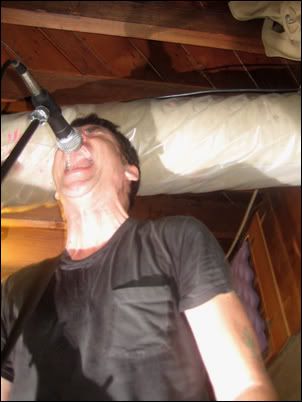 Do you look at the past as a hindrance or an asset?
Do you look at the past as a hindrance or an asset?
I used to look at it as a hindrance, but I think I broke through in the last couple years. I don’t really know when it happened. I did a lot of work on myself, getting me to enjoy my past. I found out I could actually use it a little bit to help me out.
What about regret? Is regret useless?
Yeah. If you can’t convert it into art, then it’s gonna destroy you.
What about nostalgia? Where does nostalgia lead?
I think it’s pretty good if you don’t live in it. It’s always nice when you think of somebody fondly, or go to a place and remember something or somebody. That’s part of travel, and being alive. I’m usually grateful for it, I don’t get it that often.
Really—you’re not a nostalgic person?
No, I’m sad. I’m sad. What I used to think of as nostalgia was my recognizing degraded human environments , and it was a response to poverty, I think—poverty of spirit, a lot of times, but also social poverty, aesthetic poverty in our country, the way living spaces look awful and our civilization is really ugly physically. So, yeah. There’s a big difference between sadness and nostalgia.
One of the things noticeable in this band is the apparently conscious decision to play house parties and DIY places. Can you talk a little about that?
Well, it’s how we started, when Aaron came to me. We’ve had this courtship for a decade, but really in the last few years when I started having songs, he coaxed me into going to a house show. And it was really fun. And then I felt like in order to justify going to house shows I needed to have a band; after a while, I felt like I was freeloading, like the old punk guy who goes to shows. Like, ‘I’d better have a band, to go here and hang out.’ So it was a pretty natural progression, and I think I have some indie damage from the Jets where I just never want to be in a rock club with someone from the local free weekly being disinterested and asking questions.
You know that I’m technically from the local free weekly, right?
Yeah, but you know what I’m talking about, that whole apparatus, like the person who goes to interview the Matador band that week, or whatever. So having survived that machine, I was kind of happy not to… it was really boring, honestly.
The clubs.
Yeah. And we’ll play clubs. I mean, I’d like to. But you have to have less stages, I think. We don’t have a P.A. in our rehearsal space that’s very good—it’s just a guitar amp, it’s very sketchy. It just ended up being the sound of the band, that there should be a little bit of struggle in it. The first show of this tour we played at a club in San Diego, and I have to say it was really disorienting to have a monitor. I spent years learning how to use a monitor, but I’ve completely unlearned it, and now I don’t want too much of me. I’d rather push, and hear it out in the room.
Some of your more ardent followers take issue with this whole approach, where you do shows that are word of mouth and therefore only for the in-the-know; it’s frustrating for them, and can seem kind of elitist. How would you respond to people’s concerns like that?
I can’t help them.
Well, you could play larger places.
That’s true, and I’d like to. But last time, for me, in my band, it was the other thing. The punks thought that that was elitist, and that we didn’t give a shit because we played big clubs: ‘I’m not paying eight bucks to see you, fuck that.’ So I kind of feel like it’s hard to win.
And if you’re gonna err, you might as well err on the side of…
Right. Free shows, or four-dollar pass-the-hat shows, where we have fun. I’d rather have fun first and then worry about other people’s fun. I’m pretty selfish that way.
One of your infamous positions has been leaving the punk scene behind—and now, between playing house parties and embracing a political stance, it seems like you’re rediscovering your inner punk.
Well, I became politically articulate in New York through graduate school and through the last three wars. I used to write about it, I mean, I felt it was intrinsically in me, because my parents were radicals and I grew up suspicious—I grew up in Berkeley in the late- late-’60s, I watched the Watergate hearings with my dad. It was in me, I didn’t know how to express it, and I always found it a little corny when people would do it on the nose. I had to find a voice where I felt I could be helpful. When I can put it in a song, I really like it. I just have to earn it in a way, to take on other people’s pain. I don’t want to write any kind of sloganeering song, or jingoistic song or anything. So if I can use my own subterfuge of poetic language, and do it, that’s actually where I feel like I should be writing. I’m a little tired of me. I haven’t had a relationship in a long time, so there’s no stories there. I’ve been living the Palestinian struggle for the past five years. That’s more interesting to me right now.
You have a song about Al-Qaeda in Washington.
Yeah, and it was a really quick song to write. It was just about surviving the primaries and seeing Hilary Clinton in the ascendant, which to me was a dark harbinger of more bad policy. It’s a cautionary song about not putting all your money in Obama curing the guilt of white people and saving the world. I don’t wanna say no to that, I wanna give him his shot, and I voted for him, and I would work with anyone to change anything.
Would you call yourself cautiously optimistic about his presidency?
Yeah, yeah. I think it’s only responsible to wait and give him 100 days, or four years, whatever it is. The title—the idea, to me, studying Iraq for the past few years, studying Afghanistan, studying the Western attitude toward the Arab world—“We Build Al-Qaeda in Washington,” that’s the title. The core of Al-Qaeda is in Washington. Sure, it grows in Yemen, and it grows in the Saudi oligarchy and everything, but I think we’ve done so much to foster militias around the world that the idea is you should go there and fight, you don’t need to go across the world. That’s the title, that’s the idea.
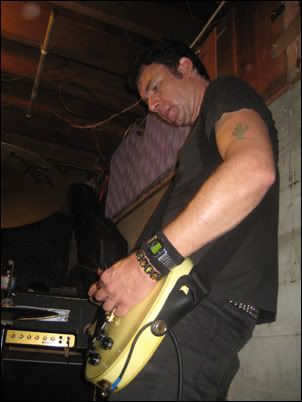 Has the punk scene changed, or have you changed?
Has the punk scene changed, or have you changed?
I think I’ve changed. I mean, yeah. I went back.
Could you imagine yourself doing a tour of house shows in, say, ’96?
No, but I longed for it many a night. I was just like, ‘This is so boring!’ Like God, these fucking places. The shows could be great, and musically it was fun to have that huge apparatus. But it’s a limited thing: you get 40 minutes of feeling powerful, and a lot of drudgery. As I said, being politically articulate helped me miss punk. I realized that those are my people. At least they’re asking those questions. Indie rock isn’t asking those questions. It’s so inward-looking and ambitious, in New York especially. It helps to be in New York, because they’re just shameless about wanting to fuck you over to get ahead.
Brooklyn, in particular?
Now, yeah. I guess now Brooklyn is this kind of Seattle. I never thought of it that way, but it’s… I just found those people not very interested in the world. Interested in their own local phone code, their own space. I was heading out into the world at the time that it seemed like that music scene was heading into itself. So punk was the only place where people were going out and marching, doing actions. They just gave a shit about the world! It seemed to be about the most important thing anyone could do in the last eight years.
You took part in some of that. I think you gave a speech in New York at some point.
I did, yeah. I have a great friend who’s a historian, a professor, and she insisted that I speak at a student walk out. She goosed me into awareness; I met a lot of great people there. It was terrifying, but I was embraced, which was nice. I just tried to do my own thing; I didn’t want to be presumptuous, so I wrote a poetic essay, I guess, and I was surprised that it seemed to register with a few people there. I was speaking with bona fide refugees and people I felt really outclassed by. All I had was band experience. But I think the people, they see you out there, they appreciate it.
Are you worried that people may be forgetting how to live in the moment?
I worry that they are forgetting how to live in the world. I don’t mean even the big world, but just in terms of going outside, or not being online. That new technology, it’s just not… I don’t quite get it yet. I know you have to give youth a shot, and some kids have really happy, connected lives that way, but I don’t feel it. I miss the bricks-and-mortar stuff.
What about the hundreds of cameras at shows? It’s reasonable to expect people to appreciate what’s happening in front of them, to experience it, but instead there’s this need to record it.
Yeah. I don’t know. I mean, we thought about… I don’t want to tell people not to do that. I just don’t have enough time in my life, I’d much rather work on making our show sound good, and playing well, and seeing the people we like.
Are you happier when people don’t take pictures all the time, film you all the time?
Yeah, of course. But I have to admit, there is this strange little vain part, if the show’s really kickass, that I think it’d be fun if I could tell my dad he could watch it, or my sister, to tell them, ‘Hey, we just played in this big closet!’
Were you nervous about tonight when you saw that tiny basement?
We had questions about how we were going to fit in there, but once we set up, once we started, it was great.
What do you think is more important, to be smart or to be honest?
That’s a tough one. Oh, I would say to be honest. And I think to be really honest, you have to be pretty intelligent. If it means being honest with yourself, or being really clear with your friends and loved ones, to communicate, you have to be smart. You can be clever, and that’s bad. Clever is like being surreptitious, and figuring out how not to be truthful. I think smart and intelligent means an ability to be honest. I’ve done a lot of work getting past clever to what I think is a broader kind of intelligence, which involves honesty.
Are you going to record an album?
Yeah.
I couldn’t help but notice Fat Mike hop on stage the other night and talk to you guys. Was that about recording at all?
I think he’d like to do something. He’s been a really supportive guy. But I don’t… we don’t have a label. We don’t have a ‘dream label’ or anything, other than one we make. It seems we’re about at that point, with technology, that you can just have your own label.
You have a reference to a Smith-Corona, and you own a Smith-Corona. Do you use it to write lyrics?
No, I don’t. That’s about Mishima, that song. It’s about writers, the verse is about Mishima committing ritual suicide. So the line is: “Hari-kari with a Smith-Corona, what the fuck? The left arm of the right wing.”
You mentioned the other night at the Hemlock that all of your songs are about suicide and unrelenting misery. Is that actually true?
Kind of! It’s surprising, yeah. I mean, they’re pretty joyous tunes, but they’re pretty dark lyrically.
Do you feel a discussion on suicide is something that’s ignored in society?
Yeah. It’s either glamorized or it’s shunned, and it’s only the most important question that everybody asks themselves, especially in their young life. It’s something you reckon with as a youth. Our song is ‘O Deadly Death,’ it’s kind of a valentine to suicidal feelings, and how important that is in your development to go to the wall, and then step back. That’s just part of identity, is finding your way to the utmost point and then reveling in the beauty of being alive.
What song do you hope you’re listening to when you die?
“Girl From the North Country,” maybe, with Johnny Cash and Bob Dylan, the duet version. That’s always a sweet, off-into-the-wilderness song.
More Photos Below.
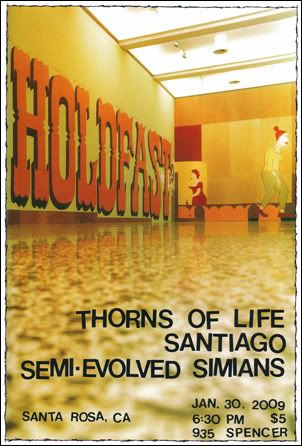
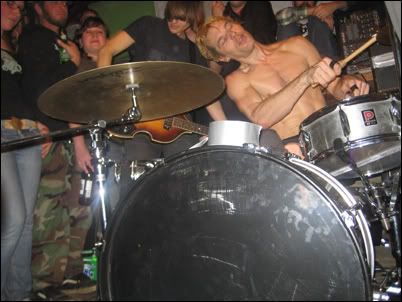
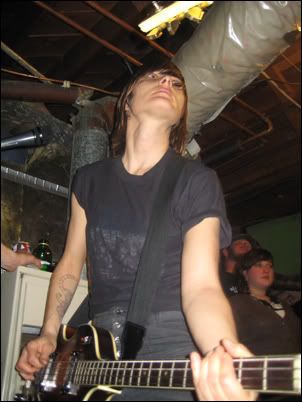
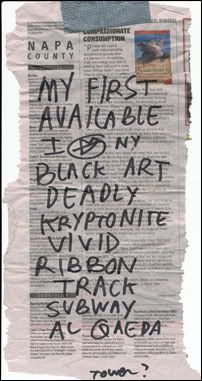
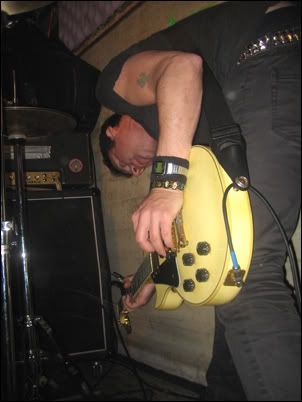
Photos taken by Liz Seward:
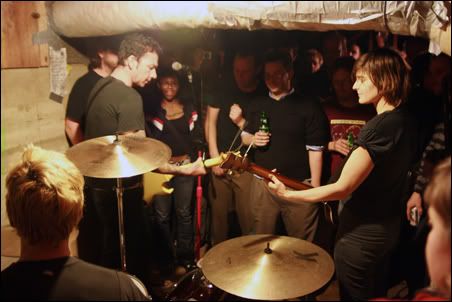
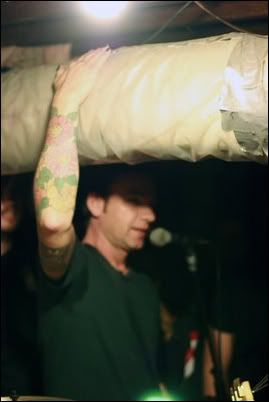
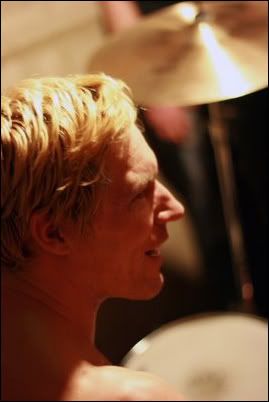
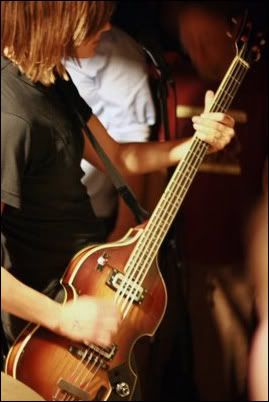
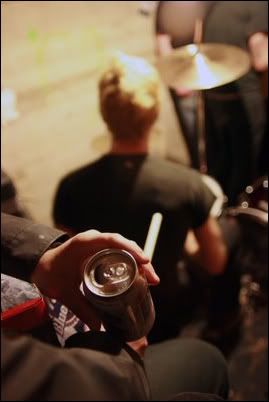









Thanks. That was really fantastic.
Wow. Wish I was there.
[…] it does the trick. Sounds good to me and I can’t wait to hear more. 3 interviews with Blake: here, here, and here. (Thanks again, […]
Much appreciated. I hope eventually they extend their tour radius to the southeast.
Thanks for the great piece. Looking forward to the album.
Sweet interview. I hope to see them live some day
Amazing read. It’s so reassuring to see that Blake is still the poetic genius he’s always been. Very few artists stay as true to themselves as Blake has. His awareness of the world and disdain for the self centered indie scene is also kinda nice.
wow…that was epic. It makes me happy there’s someone out there who still has the heart to keep music in the right places.
[…] Após o Jawbreaker, Blake formou o Jets To Brazil, que já acabou, e hoje em dia toca no Thorns Of Life. […]
[…] with J Robbins that apparently didn’t go smoothly. Friends of friends delivered the news that Thorns of Life broke up, and while I knew Aaron was out of the band, I thought Blake might at least find another […]